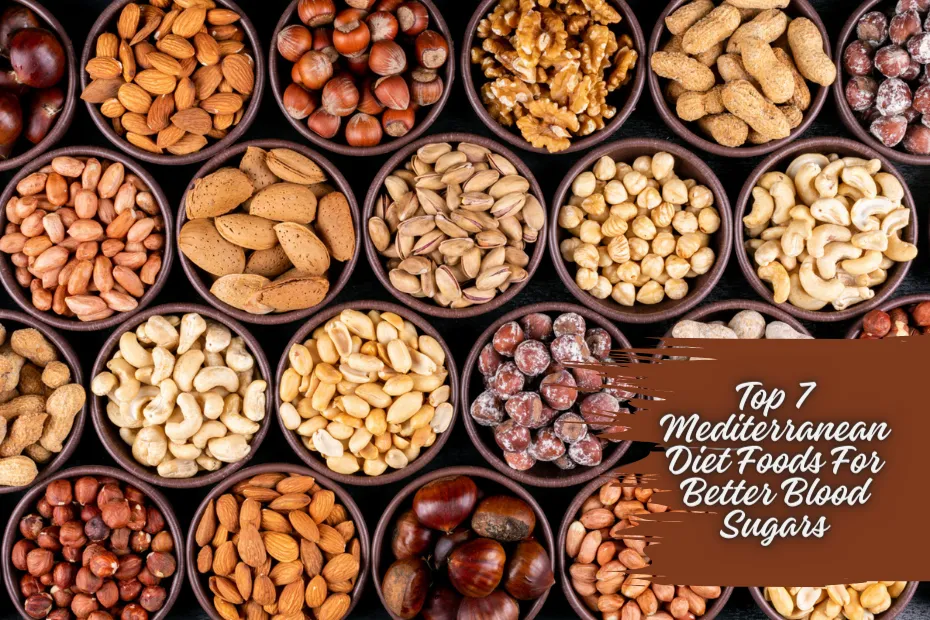Welcome to our comprehensive guide on the top 7 Mediterranean diet foods for better blood sugars. Managing blood sugar levels is crucial for overall health, especially for individuals with diabetes or those at risk of developing it.
The Mediterranean diet, renowned for its health benefits, emphasizes whole, nutrient-rich foods that can help stabilize blood sugar levels and promote overall well-being. In this article, we’ll explore seven key foods that are central to the Mediterranean diet and known for their ability to improve blood sugar control.
From heart-healthy olive oil to fiber-rich leafy greens and omega-3-packed fatty fish, incorporating these foods into your diet can make a significant difference in managing blood sugar levels and reducing the risk of complications associated with diabetes.
1. Olive Oil
Olive oil is a staple in the Mediterranean diet and is renowned for its health benefits, particularly in managing blood sugar levels. It has monounsaturated fats in it, which can make insulin work better and keep blood sugar in check.
Additionally, olive oil is rich in antioxidants, such as polyphenols, which have anti-inflammatory properties and may help reduce the risk of developing type 2 diabetes. Incorporating extra virgin olive oil into your diet as a primary fat source can promote better blood sugar control and overall health.
2. Leafy Greens
Leafy greens like spinach, kale, and Swiss chard are essential components of the Mediterranean diet and can be incredibly beneficial for managing blood sugar levels. These vegetables are low in carbohydrates and calories but high in fiber, vitamins, and minerals.
The high fiber content slows down the absorption of glucose in the bloodstream, preventing spikes in blood sugar levels after meals. Additionally, leafy greens are rich in magnesium, which plays a crucial role in insulin sensitivity and glucose regulation.
3. Fatty Fish
Fatty fish such as salmon, mackerel, and sardines are key features of the Mediterranean diet and offer numerous health benefits, including improved blood sugar control. These fish are rich in omega-3 fatty acids, which have been shown to enhance insulin sensitivity and reduce inflammation in the body.
Regular consumption of fatty fish can help lower fasting blood sugar levels and decrease the risk of complications associated with diabetes. You should eat fatty fish at least twice a week to get the most out of it.
4. Whole Grains
In the Mediterranean diet, whole grains like oats, barley, and quinoa are good sources of carbs. Unlike sweetened grains, they also have a lot of fiber, vitamins, and minerals. The fiber content in whole grains slows down the digestion and absorption of glucose, preventing rapid spikes in blood sugar levels.
Additionally, whole grains provide sustained energy, keeping you feeling fuller for longer and reducing cravings for sugary snacks. Swap refined grains for whole grains to improve blood sugar control and support overall health.
5. Legumes
Legumes such as lentils, chickpeas, and beans are a staple in Mediterranean cuisine and offer a wide range of health benefits, particularly for managing blood sugar levels. These plant-based protein sources are low on the glycemic index, meaning they have a minimal impact on blood sugar levels.
Furthermore, legumes are rich in fiber, which slows down digestion and helps stabilize blood sugar levels. Incorporating legumes into your meals can promote satiety, regulate appetite, and improve insulin sensitivity over time.
6. Nuts and Seeds
Nuts and seeds are nutrient-dense foods that provide a wealth of health benefits, including better blood sugar control. They are rich in healthy fats, protein, fiber, vitamins, and minerals, making them an ideal snack option for individuals with diabetes.
The combination of protein, fiber, and healthy fats helps slow down the absorption of glucose, preventing rapid spikes in blood sugar levels. Additionally, nuts and seeds contain magnesium, which plays a crucial role in glucose metabolism and insulin sensitivity.
7. Berries
Berries such as strawberries, blueberries, and raspberries are delicious and nutritious additions to the Mediterranean diet, offering numerous health benefits, including improved blood sugar control.
Berries are low in calories and carbohydrates but packed with antioxidants, such as anthocyanins, which have been shown to improve insulin sensitivity and reduce inflammation. Furthermore, their high fiber content helps slow down the absorption of sugar into the bloodstream, preventing spikes in blood glucose levels.
FAQs:
FAQ 1: What makes the Mediterranean diet effective for better blood sugars?
Short Answer: The Mediterranean diet emphasizes whole, nutrient-rich foods such as olive oil, leafy greens, and fatty fish, which are low in refined sugars and high in fiber, healthy fats, and antioxidants. These components help regulate blood sugar levels, improve insulin sensitivity, and reduce inflammation in the body, making it an effective dietary approach for managing blood sugars.
FAQ 2: Can I still enjoy sweets on the Mediterranean diet?
Short Answer: While the Mediterranean diet encourages the consumption of whole, minimally processed foods, it also allows for moderation. Opt for natural sweeteners like honey or enjoy small portions of desserts made with whole ingredients like fruits and nuts. However, it’s essential to limit the intake of refined sugars and high-calorie treats to maintain blood sugar control and overall health.




